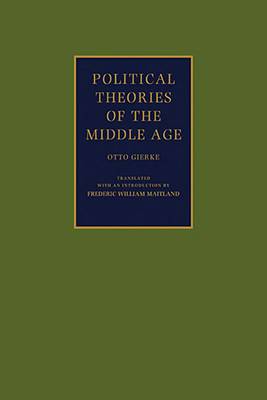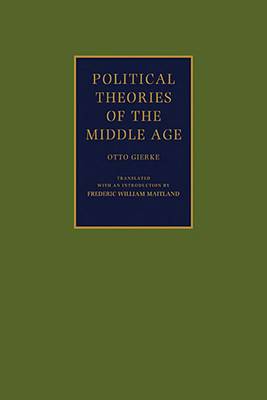
Je cadeautjes zeker op tijd in huis hebben voor de feestdagen? Kom langs in onze winkels en vind het perfecte geschenk!
- Afhalen na 1 uur in een winkel met voorraad
- Gratis thuislevering in België vanaf € 30
- Ruim aanbod met 7 miljoen producten
Je cadeautjes zeker op tijd in huis hebben voor de feestdagen? Kom langs in onze winkels en vind het perfecte geschenk!
- Afhalen na 1 uur in een winkel met voorraad
- Gratis thuislevering in België vanaf € 30
- Ruim aanbod met 7 miljoen producten
Zoeken
€ 64,95
+ 129 punten
Uitvoering
Omschrijving
This re-issue of F. W. Maitland's translation of a vital section from Otto Gierke's monumental Das Deutsche Genossenschaftsrecht makes available once again one of the seminal texts in the historiography of political thought. Famed, inter alia, for the elegance and lucidity of Maitland's own expository introduction, Political Theories of the Middle Age is concerned in essence with the medieval development of the doctrine of State and Corporation - a concept which, as Maitland indicates, has been prone to misunderstanding by English minds versed in the tradition of the common law. Gierke identifies the peculiar characteristic of medieval political thought as its vision of the universe as one articulated whole, and every being, whether a joint-being (community) or a single-being - as both a part and a whole: his text examines the potentially revolutionary effect upon this of certain crucial intellectual intrusions, derived in part from Roman Law, described by Gierke as 'ancient-modern'.
Specificaties
Betrokkenen
- Auteur(s):
- Vertaler(s):
- Uitgeverij:
Inhoud
- Aantal bladzijden:
- 280
- Taal:
- Engels
- Reeks:
Eigenschappen
- Productcode (EAN):
- 9780521347648
- Verschijningsdatum:
- 27/11/1987
- Uitvoering:
- Paperback
- Formaat:
- Trade paperback (VS)
- Afmetingen:
- 152 mm x 229 mm
- Gewicht:
- 412 g

Alleen bij Standaard Boekhandel
+ 129 punten op je klantenkaart van Standaard Boekhandel
Beoordelingen
We publiceren alleen reviews die voldoen aan de voorwaarden voor reviews. Bekijk onze voorwaarden voor reviews.









